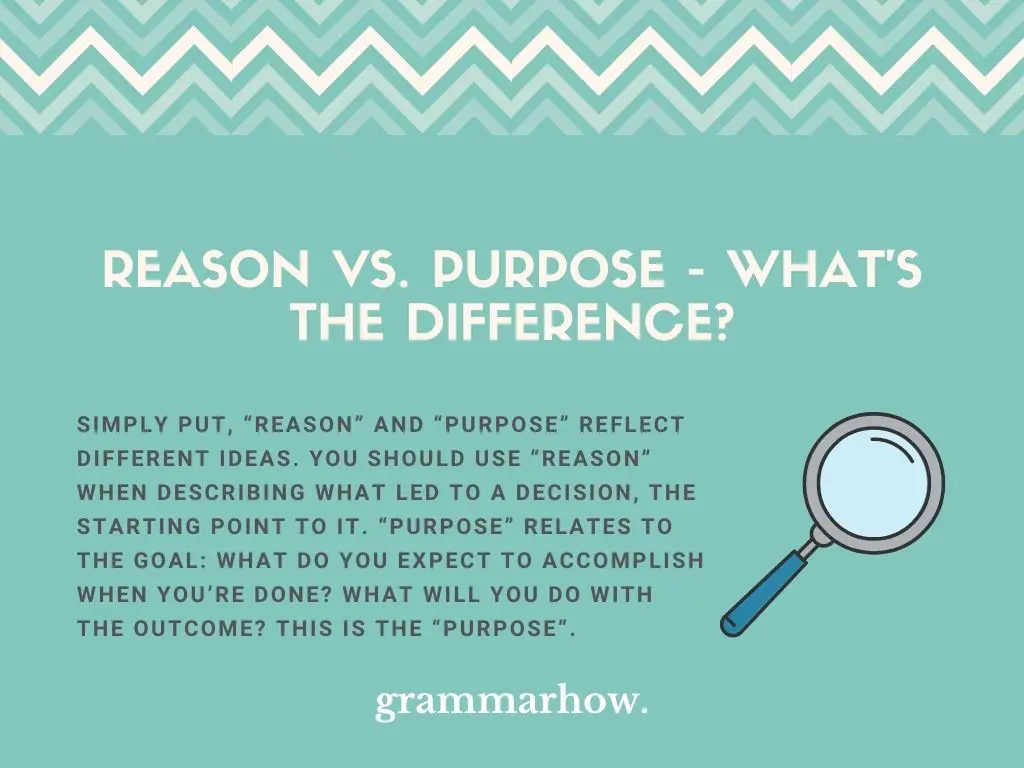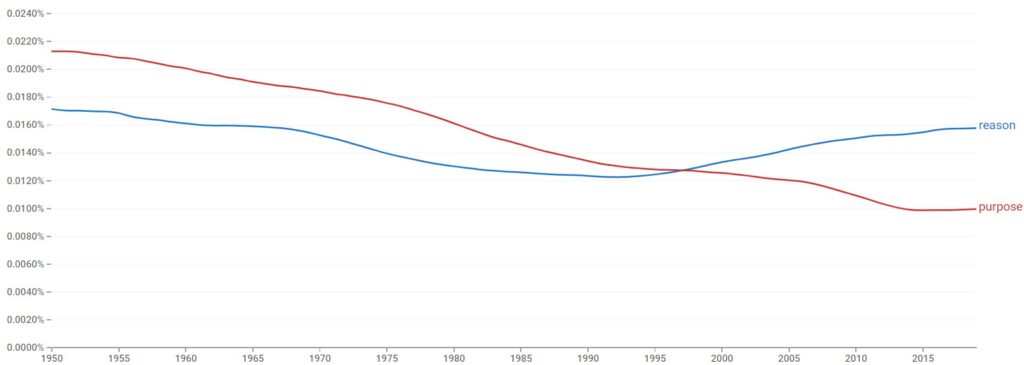Although “Reason” and “Purpose” relate to the motive why an individual does something, they don’t mean exactly the same thing. We want to dig into those words and find out what they mean and how we can use them in daily life correctly.
Reason vs. Purpose – What’s the Difference?
Simply put, “Reason” and “Purpose” reflect different ideas. You should use “Reason” when describing what led to a decision, the starting point to it. “Purpose” relates to the goal: what do you expect to accomplish when you’re done? What will you do with the outcome? This is the “Purpose”.

Let’s take a look at some examples, before moving forward:
- His reason for leaving home was his overbearing parents.
- His purpose of leaving home was to make a new life for himself somewhere new.
- The reason why Anna stayed at her job was the steady pay.
- Anna stayed at her job with the purpose of getting a promotion and a raise.
In the first set of sentences, a man leaves his home. The fact is the same in both. Also, both sentences give us the motive that led him to do it.
However, in sentence 1, he had a “Reason”: overbearing parents he wanted to get away from. In sentence 2, he had a “Purpose”: to make a new life for himself.
Reason
The “Reason” is usually a starting point, and reflects where an individual is coming from when making a decision.
According to The Cambridge Dictionary, a “Reason” is “the cause of an event or situation or something that provides an excuse or explanation”. A “Reason” provides a background to what happened, explaining what caused it.
Those are good examples of “Reason” in a sentence:
- The reason for his anger was unclear to all of us.
- William didn’t understand Paula’s reason for leaving.
- Steve had his reasons for not speaking to Quentin.
- The reason she was calling was to ask me to babysit this weekend.
- The cake isn’t ready – that’s the reason I can’t give you a slice.
To state a “Reason” certainly helps to understand why something happened or why things are the way they are. But “Reason” points to the past, providing an explanation to what was or what happened.
Purpose
“Purpose” points to the intention an individual has when making a decision or taking an action. It is connected to a goal, in the future.
The definition we find in The Cambridge Dictionary simply says that a “Purpose” is “why you do something or why something exists”. Opposite to “Reason”, the word “Purpose” looks to the future and to what we wish to achieve.
Those are good examples of “Purpose” in a sentence:
- She’s still trying to find her purpose in life.
- Did you do that on purpose?
- Terry’s purpose in donating all that money was to support those children.
- The purpose of my research is to cure cancer.
- The purpose of my company is to give back to the community.
When someone has a “Purpose”, be it a momentary one or a life’s purpose, it indicates where that individual (or company, for example, as we see in sentence 5) wants to go and what is their intention.
A “Purpose” pushes you forward, while a “Reason” keeps you grounded.
Which Is Used the Most?
“Purpose” or “Reason”? One of these words is used more frequently than the other, and we want to know which. Take a look at the graph from Google Ngram Viewer below, to find out.

Until the early 1990’s, “Purpose” was used more often than “Reason”. Around that time it changed and “Reason” became more commonly used, when compared to “Purpose”.
We believe that the motive for it is that in recent decades the idea of having a greater “Purpose” might have gotten lost on some. Difficulties and challenges in daily life take our focus from the greater goal in our lives.
Therefore, “Purpose” lost some space to “Reason”.
Final Thoughts
Both “Reason” and “Purpose” are connected with the motivation an individual or organization has. “Reason” looks to the past, to find that motive and go on. “Purpose” looks to the future, to find a motive to keep on going. Think about that when sharing your own motivation for your actions.
